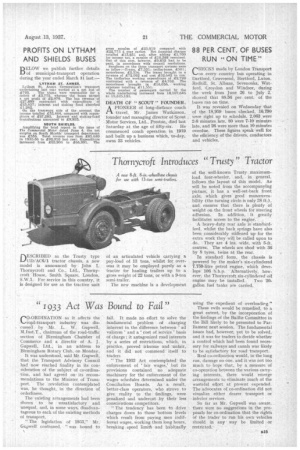1933 Act Was
Page 49

If you've noticed an error in this article please click here to report it so we can fix it.
Bound to Fail"
C0-ORDINATION as it affects the rod-transport industry was discussed by Mr. L. IV. Gupwell, M.Inst.T., chairman of the road-traffic section of BirminghamChamber of Commerce and a director of A. J. Gupwell, Ltd., in an address to Birmingham Rotary Club. on Monday.
It was understood, said Mr. Gupwell, that the Transport Advisory Council had now reached finality in its consideration of the subject of co-ordination, and had agreed on its recommendations to the Minister of Transport. The revolution contemplated was, he thought, in the direction of orderliness.
The existing arrangements had been shown to be unsatisfactory and unequal, and, in some ways, disadvantageous to each of the existing methods of transport.
" The legislation of 1933," Mr. Gupwell continued, " was bound to fail. It made no effort to solve the fundamental problem of charging inherent in the difference between ,` ad valorem' and a 'cost of service ' basis of charge ; it antagonized road interests by a series of restrictions, which, in practice, proved irksome and unfair, and it did not commend itself to traders " The 1933 Act contemplated the enforcement of fair wages,' but its provisions contained no adequate machinery for the enforcement of the wages schedules determined under the Conciliation Boards. As a result, better-class operators, who strove to give reality to the findings, were penalized and undercut by their less conscientious competitors.
"The tendency has been to drive charges down to those bottom levels which result from paying men indifferent wages, Working them long hours, breaking speed limit% and habitually using the expedient of overloading."
These evils would be remedied, to a great extent, by the incorporation of the findings of the Baillie Committee in the Bill likely to be presented to Parliament next session. The fundamental issues had, however, yet to be solved, and it was for traders to decide whether a control which had been found necessary for railways and canals was likely to be satisfactory for road transport.
Real co-ordination would, in the long run, damage no one and it was not too much to hope that, by a measure of co-operation between the various carrying interests, there would emerge arrangements to eliminate much of the wasteful effort at present expended. The advocates of co-ordination did not visualize either dearer transport or inferior services.
So far as Mr. Gupwell was aware, there were no suggestions in the proposals for co-ordination that the rights of the trader to run his own vehicles should in any way be limited or restricted.




















































































